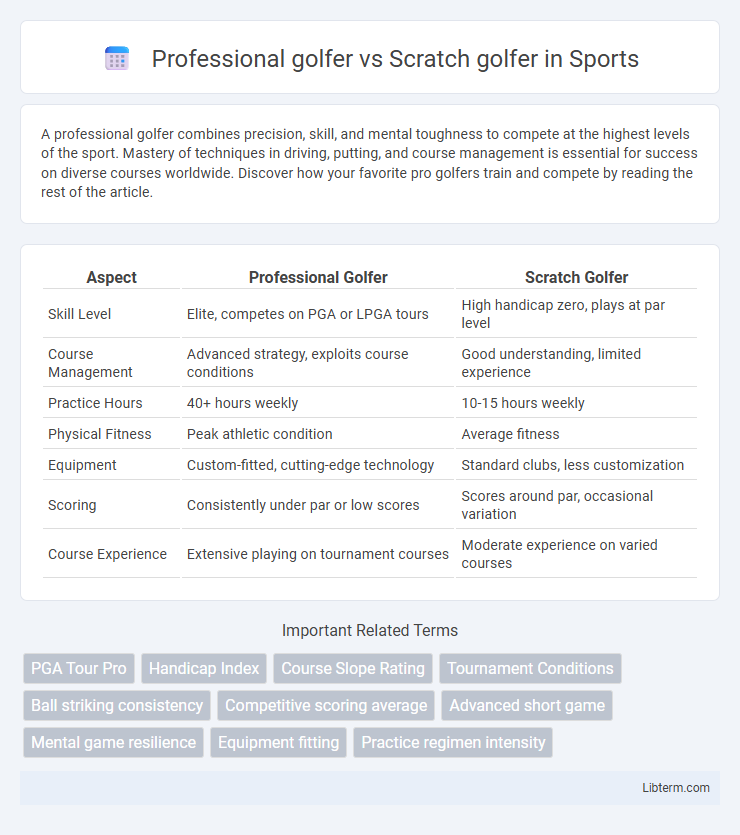A professional golfer combines precision, skill, and mental toughness to compete at the highest levels of the sport. Mastery of techniques in driving, putting, and course management is essential for success on diverse courses worldwide. Discover how your favorite pro golfers train and compete by reading the rest of the article.
Table of Comparison
| Aspect | Professional Golfer | Scratch Golfer |
|---|---|---|
| Skill Level | Elite, competes on PGA or LPGA tours | High handicap zero, plays at par level |
| Course Management | Advanced strategy, exploits course conditions | Good understanding, limited experience |
| Practice Hours | 40+ hours weekly | 10-15 hours weekly |
| Physical Fitness | Peak athletic condition | Average fitness |
| Equipment | Custom-fitted, cutting-edge technology | Standard clubs, less customization |
| Scoring | Consistently under par or low scores | Scores around par, occasional variation |
| Course Experience | Extensive playing on tournament courses | Moderate experience on varied courses |
Defining Professional and Scratch Golfers
A professional golfer earns income by competing in sanctioned golf tournaments or through sponsorship deals, demonstrating a consistently high level of skill and competitive success. A scratch golfer, by contrast, achieves a handicap index of zero, indicating the ability to play to par on standard golf courses but does not necessarily compete for prize money. The distinction lies in professional status tied to earnings and competition, whereas scratch golfers are defined by their exceptional playing ability without professional affiliation.
Key Differences in Skill Level
Professional golfers consistently exhibit superior skill levels compared to scratch golfers, demonstrated by their ability to perform under intense competitive pressure and maintain lower scoring averages. While scratch golfers possess excellent technique and can play at par on any course, professional golfers combine precision, strategic course management, and mental resilience honed through years of high-level competition. The key difference lies in the professionals' ability to execute complex shots consistently and adapt to variable playing conditions, elevating their performance beyond the skilled but amateur scratch golfer.
Practice Routines: Pro vs Scratch
Professional golfers engage in rigorous daily practice routines, including full-swing drills, short game exercises, and mental conditioning tailored to tournament demands, often totaling 4 to 6 hours per day. Scratch golfers typically practice 3 to 4 times per week, focusing on maintaining consistency in swing mechanics and short game proficiency, usually for 1 to 2 hours per session. Professionals also employ advanced technologies like launch monitors and biomechanics analysis, whereas scratch golfers rely more on self-assessment and conventional coaching methods.
Tournament Experience and Pressure
Professional golfers possess extensive tournament experience, regularly competing in high-stakes events with large audiences and significant prize money, which hones their ability to manage intense pressure. Scratch golfers, while highly skilled with a handicap of zero, usually gain experience through amateur competitions with less rigorous pressure and fewer spectators. The difference in exposure to elite competitive environments allows professional golfers to develop superior mental resilience and strategic adaptability under tournament stress.
Equipment Choices and Customization
Professional golfers typically use fully customized equipment, including clubs tailored to specific lofts, shaft flexes, and grips to maximize performance under tournament conditions. Scratch golfers, while often investing in quality gear, usually opt for off-the-shelf or semi-custom clubs that balance performance with affordability and versatility. The customization level of professional equipment reflects advanced swing characteristics and precision needs, whereas scratch golfers prioritize equipment that supports consistent play across various course conditions.
Mental Game and Focus
A professional golfer exhibits exceptional mental resilience and unwavering focus, enabling consistent performance under intense pressure during tournaments. Scratch golfers possess strong mental discipline and concentration but may lack the experience to maintain peak focus through prolonged, high-stakes competition. The ability to manage stress, maintain confidence, and stay mentally sharp differentiates professional golfers in their mastery of the mental game compared to scratch golfers.
Course Management Strategies
Professional golfers employ advanced course management strategies, utilizing precise shot selection and risk assessment based on extensive experience and real-time conditions. Scratch golfers also develop solid course management skills but often rely more on consistent execution and conservative play to minimize errors. Professionals optimize yardage data, wind factors, and green layouts to gain scoring advantages, whereas scratch golfers emphasize strategic positioning and safe landing zones to maintain par.
Physical Fitness and Conditioning
Professional golfers maintain rigorous physical fitness and conditioning regimens that include strength training, cardiovascular workouts, and flexibility exercises to enhance power, endurance, and injury prevention. Scratch golfers, while skilled in technique and consistency, often have less structured fitness programs, focusing mainly on golf practice rather than comprehensive physical training. The heightened physical conditioning in professional golfers contributes to improved swing mechanics, faster recovery, and sustained performance during competitive play.
Scoring Consistency and Statistics
Professional golfers maintain scoring averages typically between 68 and 72, showcasing remarkable consistency under tournament pressure, with statistical data highlighting lower stroke variance and frequent sub-par rounds. Scratch golfers, by definition, play at a handicap of zero, averaging scores around par but exhibiting greater variability in consistency and fewer rounds below par compared to professionals. Statistical analyses reveal professionals outperform scratch golfers significantly in metrics such as greens in regulation (GIR) and driving accuracy, contributing to their superior scoring consistency and tournament success.
Pathways to Turning Professional
Professional golfers typically follow rigorous pathways involving advanced coaching, participation in developmental tours such as the Korn Ferry Tour or European Challenge Tour, and success in qualifying schools (Q-School) to earn PGA or European Tour cards. Scratch golfers, defined by a handicap of zero, often excel in amateur competitions and regional tournaments but must transition through competitive amateur circuits and sponsorship opportunities to bridge the gap toward professional status. This progression requires consistent high-level performance, strategic tournament selection, and securing endorsements or financial backing to sustain the demands of professional golf.
Professional golfer Infographic

 libterm.com
libterm.com